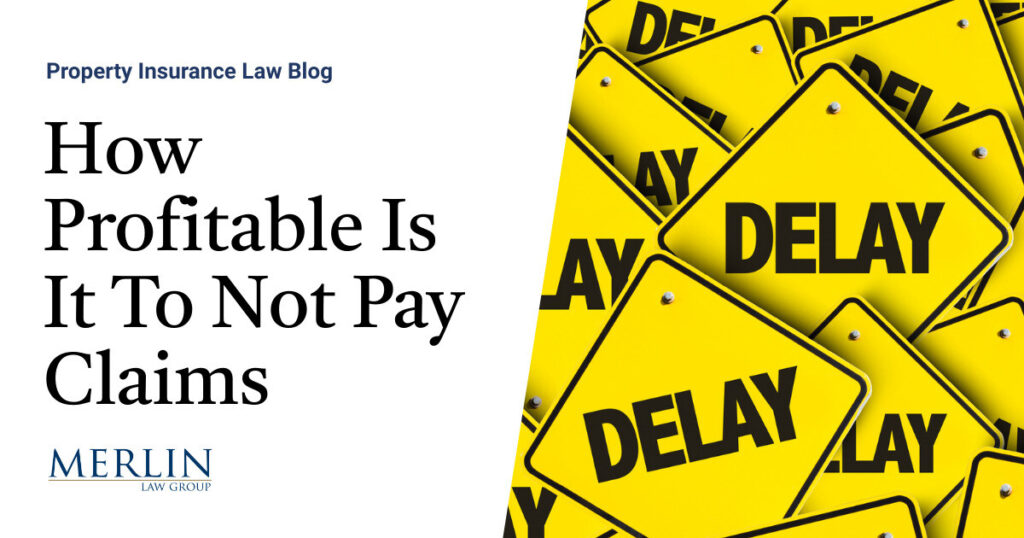How Profitable Is It To Not Pay Claims? An Example of Why Insurers Want To Make Bad Faith, Penalties For Delay, Payment of Prejudgment Interest, and Attorney Fees Extinct

Think of what the cost would be for somebody to pay for a five-year legal battle with an insurance company, knowing that the matter would have to obtain a trial court order and then win again on appeal. How much money does the insurance industry wrongfully pocket because its wrongful payment decisions go unchallenged? I’ll submit that it is probably far greater than the crazy fraud statistics made by the insurance industry. Of course, there is no insurance industry “Coalition Against Unfair Claims Denial,” which monitors its own bad actors. These issues are important when thinking about the size of a typical loss and the insurance industry’s incessant lobbying to reduce penalties and accountability for good faith claims obligations.
I was thinking about this while reading a State Farm case, which stands for the longstanding proposition that “incur” means a policyholder only has to have a contract so that the expense is “incurred” versus “payment,” which may mean that the money has been paid.1 The case was over a dispute involving around $40,000. The water loss happened in August 2018. After State Farm refused to pay for the water loss, the policyholder filed a lawsuit in February 2019. State Farm then demanded appraisal. State Farm’s appointed appraiser and the Umpire signed the award in March 2020. State Farm then only paid a little more than $1 thousand.
State Farm made the following losing argument, which the appellate court did not accept:
State Farm’s primary argument is that the meaning of ‘incur’ in its policy includes an implicit, unwritten requirement that an insured must sign a repair contract that contains no opportunity for cancellation. State Farm concedes that this gloss on the meaning of ‘incur’ is not specifically set out in its policy. Indeed, an insured would have no warning that such a requirement exists until the denial of its claim on this basis. As such, the plain meaning of ‘incur’ as used in State Farm’s policy does not contain even a hint that an insured’s contract must be non-voidable before payment will be allowed. State Farm’s interpretation simply adds an undisclosed requirement that the policy language does not support.
The problem is that this type of claims culture is now prevalent in many insurance companies. Anybody can easily start to argue a multitude of reasons for non-payment or lowering payment of every loss. Most of the insurance companies with these claims cultures have claims management goals, leakage goals, and other incentive-structured management metrics to support the incessant nitpicking denials and culture to pay as little as possible. These same companies also have large lobbying and propaganda budgets to prevent laws that protect policyholders from such a claims culture.
Let’s go one step further—how many water loss “tear out” claims does State Farm have every year? It must be hundreds of thousands. Suppose this loss happened in a state with no bad faith, no attorney’s fees, and no prejudgment interest. How profitable is it for State Farm to take the same losing position, knowing just about nobody would be able to hire an attorney to take the matter on because the cost to do so would equal the amount to be gained? How many policyholders just walk away?
I also read the policyholder appellate brief and noted that other trial court judges throughout Florida had already ruled the same way that the appellate court did on what the word “incur” means:
In cases throughout the state, State Farm has invoked appraisal and then refused to pay the Tear Out amount awarded to insureds during appraisal even after the insureds entered into contracts with a general contractor to perform the Tear Out. Like in this case, trial courts have denied nearly identical arguments that State Farm does not owe the Tear Out amount and entered summary judgment in favor of insureds requiring State Farm to pay the appraisal award amount for Tear Out:
Burns v. State Farm Insurance Co., 2018-CA-004156 (Polk County, Judge Steven L. Selph) (March 1, 2021);
Gant v State Farm Insurance Co., 2D22-2590, 19-CA-004299 (Hillsborough County, Judge Rex M. Barbas) (July 15, 2022);
Hester v. State Farm Insurance Co., 6D23-1022, 19-CA-001129 (Polk County, Judge James A. Yancey) (October 26, 2022);
Gordon v State Farm Insurance Co., 2019-CA-000714 (Duval County, Judge Virginia Norton) (November 4, 2022);
McClendon v. State Farm, 1D22-4099, 16-2019-CA-002324 (Duval County, Judge Katie Dearing) (November 18, 2022).
How profitable is it to not fully and promptly pay claims? The competitive insurance industry knows it is very profitable or even required now. The problem is that “bad actors” who advertise on price are driving this type of conduct. Once enough competitors are paying less based on a culture of claims severity reduction with no consequence, the otherwise good actors have to keep up or lose market share. This concept is not complex economics.
For policyholders and those interested in protecting the rights of policyholders, we need to demand measures to prevent this systemic bad faith claims culture. I will write much more about this issue because it is the major overreaching issue of the day that needs fixing before the insurance product loses all legitimacy.
Thought For The Day
Reducing claims frequency and severity can lead to reduced insurance premiums. It is essential to check how you are doing today concerning claims frequency and severity data.
—Bryson Insurance Blog
1 State Farm Ins. Co. v. James, 374 So.3d 934 (Fla. 5th DCA 2023).







